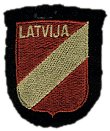10
[1This was permitted for two reasons: first, the occupation government was not in a position to exert] 2control over the populace until its massive police apparatus (the analogue of the Reich Security Main Office) was in place, and second, 3during this period the paramount goals of the Self-Government and the occupation government were the same.
However, this mutually beneficial relationship was short-lived. By mid-July the occupation government was prepared to assert itself and to implement a policy which was at odds with that of the indigenous leadership, namely, exploiting the region's resources for the benefit of the Reich rather than for Latvia. 4The Self-Government's power base, the Self-Defense, was accordingly removed from Latvian control and subordinated to the head of the German police establishment in Latvia, SS and Police Leader Schroeder. 11/
5It was at this point that the Self-Defense operation shifted from Merkela Street to Annas Street and the name was changed to Kartibas Dienest. 12/ At about the same time, the haphazard rounding up of Jews ceased; instead, the Jews were restricted to a ghetto, where they, could be exploited more easily. The transition was complete by October 25, 1941, when the fence around the ghetto was closed. (tr. 365)
| 11/ | 6The transformation of the Self-Defense from an autonomous nationalist organization into para-military police battalions under the control of the SS is central to this case. It is discussed more fully at pp. 19-20. |
| 12/ | 7Literally, "order service." The Kartibas Dienest [sic.] (known in German as the "schutzmannschaft") was part of the regular or uniformed police (ordnungs polizei) which was established by the SS at the beginning of the occupation. For the evolution of the Kartibas Dienests see INFRA, 19-20. |
Examination
[page 9] 1“This was permitted for two reasons: first, the occupation government was not in a position to exert” [page 10] 2“control over the populace until its massive police apparatus (the analogue of the Reich Security Main Office) was in place”
It is patently false to contend that the invading Nazi forces did not establish full control as they entered each territory. That administration was eventually transitioned from the Wehrmacht to an ostensibly civilian authority does not imply the Germans did not immediately establish complete control.
By its prior falsification of Nuremberg trial records to contend a pre-invasion "Germanless Holocaust," the INS clearly intends that the "same" goals are the eradication of Jewry. The Latvian "Self-Government" is a figment of propaganda. There were no such shared goals.
4“The Self-Government's power base, the Self-Defense, was accordingly removed from Latvian control and subordinated to the head of the German police establishment in Latvia, SS and Police Leader Schroeder.” . . . [footnote] 6“The transformation of the Self-Defense from an autonomous nationalist organization into para-military police battalions under the control of the SS is central to this case.”
"Self-defense" was never an autonomous or centrally administered Latvian function. There was no Latvian "power base" in competition for control with the invading Wehrmacht forces. Local partisan forces were immediately subordinated to the Wehrmacht then disbanded as soon as no longer required.
Moreover, the subsequent subordination to the SS which the INS contends is "central" to the case, that is, the contention that organizational subordination automatically and by definition denotes "Holocaust perpetrator," was thoroughly disproved by expert American testimony for the defense.
5“It was at this point that the Self-Defense operation shifted from Merkela Street to Annas Street and the name was changed to Kartibas Dienest.” . . . [footnote] 7“Literally, 'order service.' The Kartibas Dienest [sic.] (known in German as the 'schutzmannschaft') was part of the regular or uniformed police (ordnungs polizei) which was established by the SS at the beginning of the occupation.”
Beyond the INS's erroneous contention that "Self-Defense" was an autonomous organization, we can already anticipate issues of terminology of Latvian versus German, as they are unlikely to always completely align. For example, while Selbstschutz means self-defense, it was not "self-" in implications of autonomy from the Germans. Both Hilfspolizei and Schutzmannschaft translate as auxiliary police, however, organizationally, the latter reported to the SS; combat units, however, were under Wehrmacht command and did not participate in the Holocaust.
The "Kārtības Dienests" was originally established reporting to the "Nord" German police regiment, titled "Kārtības palīgpolicija Rīga" (Ordnungs–Hilfspolizei Riga).1 Voldermārs Veiss' "Kārtības Dienests" command consisted of approximately 500 men in 5 separate companies ostensibly dedicated to guarding strategic assets but actually a recruiting reserve (Rekrutierungsreserve) for duty at the front, and not involved in the Holocaust. Testimony established that the German nomenclature, i.e., formal organizational alignment, for Veiss' unit changed a number of times, however, its function did not. From a personal standpoint, Veiss' anti-Sovietism was motivated by having lost family and relatives to the Soviets while he had gone underground during the Soviet occupation. Veiss had been the military attaché to Finland when the USSR invaded.
| 1 | The INS's account can be confusing as it fails to clarify its use of terms, for example, is "hilfspolizei" a generic reference to "assistant police" or is it meant as the formal "Hilfspolizei" organization originally set up by the Wehrmacht? We find it odd that the INS would choose to not properly capitalize any of its German organizational references in a legal document while suffering no such impediment in Latvian. |
